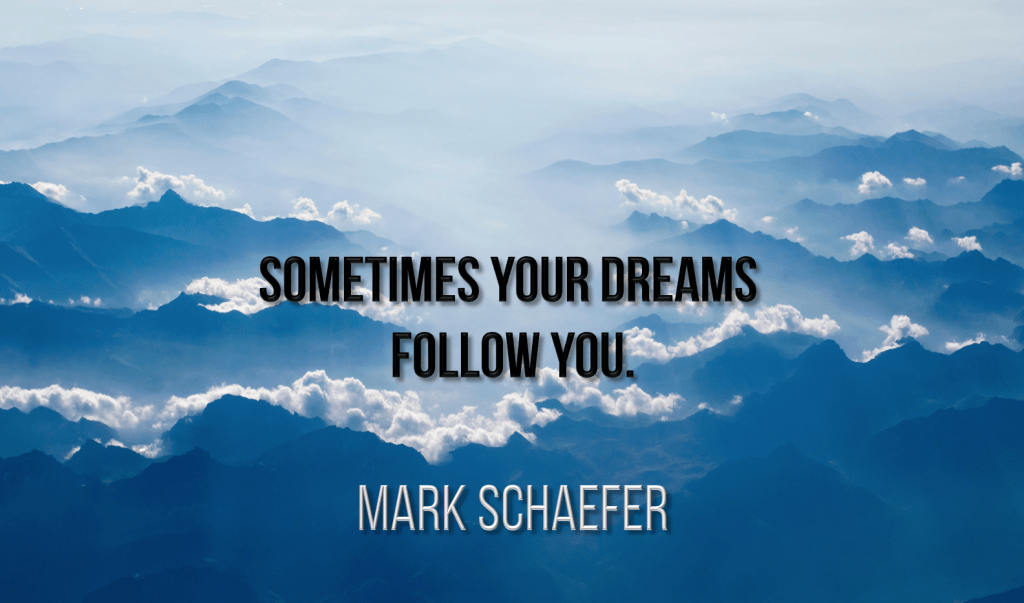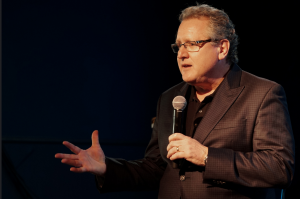
By Mark Schaefer
When I was a little boy I wanted to be a baseball player or an astronaut. Neither of those things worked out exactly, but I have landed in a career that’s very satisfying and fun. I didn’t dream of being a marketing consultant. Marketing was a career choice that became my passion.
Like so many successful people I came to know through writing my book KNOWN: The handbook for building and unleashing your personal brand in the digital age, I didn’t necessarily follow my passion or my dream … my passion followed me.
This was a pattern I heard over and over again from people who are absolutely killing it in their fields. They DIDN’T follow their passions at all. This runs counter to most of the entrepreneurial advice you hear on the web, but a lot of research supports that this is how it works for most people who make it. You grow into a dream.
Let’s look at one of my favorite examples. I met my friend Roger Dooley about three years ago at a conference. We were both speakers that day and I had the good fortune of sitting with him throughout the event. We became friends and I admire the career he has built for himself as an author, speaker, and consultant on neuromarketing.
Like me, Roger didn’t sit around day-dreaming about being an authority on neuromarketing when he was a young man. His inspiration came from his daughter … sort of.
The Roger Dooley story
Roger’s early career was spent building businesses in the emerging tech industry, with an emphasis on web and SEO.
It wasn’t until Roger started poring through his daughter’s college text book on neuroscience that an interest was sparked in the psychological aspects of marketing, especially as it relates to the ability to do testing and collect data on the web.
He discovered that nobody else he could find was exploring this idea of “neuromarketing.” He bought a couple of related domain names and got to work by diving into the subject. Roger started blogging consistently – at least one post a week. At first, he was unsure of his impact. Was anybody out there reading? Did anybody care?
But he kept going. He started to see signs of interest in his work and after more than two years of effort, he began to realize some real success, including an offer to write a book!
The book led to speaking engagements and a rapidly-increasing fan base. His blogging helped him discover new themes for a second book, which became a topic for a new speech. After patiently building a large audience on his blog, he brought that audience over to a new podcast on the subject and his reputation was further amplified.
The fact that he is “known” for something today provides Roger a permanent and sustainable advantage that opens new doors, creates exciting new business opportunities, and establishes a “buffer” against industry changes that may sweep away the people who are not known in his field.
The path to becoming known
In my research for my book, I found that there were four steps on the path to becoming known. Let’s see if Roger’s journey mirrored this standard path.
STEP ONE – The sustainable interest: Successful people don’t necessarily follow their “passion.” In this case, Roger didn’t have an innate passion for neuromarketing. He established a business around it and now he loves the subject.
This is a characteristic of successful people. They love what they do, but more important, the topic they choose is “sustainable” – there is an audience big enough to matter, big enough to help you achieve your goals. Roger found a unique topic that he could be known for, and an audience willing to pay him for what he does.
STEP TWO – The space: Roger identified a potential sustainable interest, but a key to his success is that his niche was un-contested. Nobody else was becoming known about neuromarketing! This was a “space” that he could own. If he created content consistently over a period of time, it is a space he could even dominate.
STEP THREE – The fuel: Becoming known in the digital age is fueled by content, specifically written content like a blog, audio content like a podcast, or video content. Roger started blogging because he loved writing and his passion for his subject and personality shined through.
Most important, he created content consistently. For most people, it takes between two and three years for a personal brand to “tip.” So Roger’s “grit” and determination paid off.
STEP FOUR – The audience: The value of your content is zero, unless people see it and share it. Roger’s business success depended on building an audience big enough to make his dreams come true. It had to be an actionable audience beyond the unreliable, weak relational links of social media.
Roger worked tirelessly to connect to people, help them, and support their own goals. The positive support from his audience reinforced for Roger that he had a “purpose.” He was teaching people, inspiring them, and having an impact.
The classic case
So yes – Roger’s path was identical to the many people featured in my book. In fact, Roger represents the classic case of how people become known today. He found his place (what he wanted to be known for), his space (an un-contested niche), his fuel (this blog, and later a book and podcast), and an audience that mattered.
Roger was consistent and kept working, even when he was unsure of his impact. He was patient and didn’t try to be on every platform. He’s driven by more than merely selling stuff – he has a purpose that keeps him going every week. He succeeded because he had something more than a passion — he had a plan and stuck to it.
Being known today can provide an advantage in so many ways. What do you want to do with your life? Start or grow a business? Get more leads? Write a book or start a speaking career? Attract more donations for your charity? All of these goals, and many more, can be ignited by becoming known.
The prospect of establishing a meaningful internet presence may seem overwhelming, but it doesn’t have to be. It really does follow these four steps, consistently applied.
The internet is just beginning. There’s room for you, too. Perhaps it’s your turn … to become known!
 Mark Schaefer is the chief blogger for this site, executive director of Schaefer Marketing Solutions, and the author of several best-selling digital marketing books. He is an acclaimed keynote speaker, college educator, and business consultant. The Marketing Companion podcast is among the top business podcasts in the world. Contact Mark to have him speak to your company event or conference soon.
Mark Schaefer is the chief blogger for this site, executive director of Schaefer Marketing Solutions, and the author of several best-selling digital marketing books. He is an acclaimed keynote speaker, college educator, and business consultant. The Marketing Companion podcast is among the top business podcasts in the world. Contact Mark to have him speak to your company event or conference soon.


